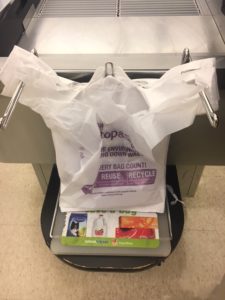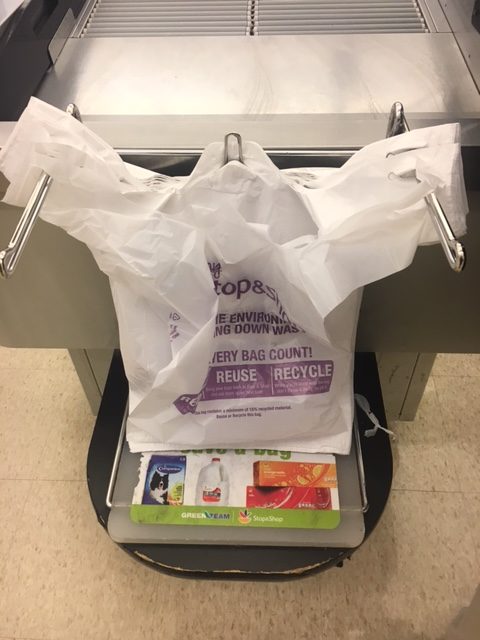
It is a genuine law of economics, because it is a central law of human nature: if you tax something, you get less of it. A necessary corollary: most taxes bring in less revenue than predicted because people modify their behavior to avoid the tax. Connecticut’s elected officials have been ignoring these basic facts for years, because they don’t like the inevitable consequence: that government must shrink in Connecticut, one way or the other, and fairly soon. But this plastic-bag tax fiasco presents a story too simple and clear for its lesson to be avoided. We’ve reached the end of the tax-hike road.
Well, that didn’t take long.
Various Connecticut grocery stores have announced that, in anticipation of the plastic-bag tax that will take effect on August 1st, they will stop offering plastic bags at all. Instead, some will offer paper bags – for a dime each. Additionally, they will offer free or discounted reusable bags for a limited time.
That’s a pretty obvious move for them. Connecticut customers will be irritated about having to pay for plastic bags no matter what. Some of that irritation will fall on the state for setting the tax, but some of it will fall on the grocery store for having to administer the tax. But all of the cost of buying the plastic bags will fall on the grocery store, while all of the revenue from the tax will go to the state. That’s a complete lose/lose situation for grocery stores.
So, they avoided it. No more plastic bags, at all. Everyone will know that this is because the state taxed them (and, in fact, very many people will think that the state’s eventual plan to ban the bags entirely begins on August 1st).
Meanwhile, at least one grocery store will offer paper bags – a substitute apparently favored by the state – for a dime. That dime will go to the grocery store to cover their costs in buying those paper bags (and maybe a bit more in profit for the store), with nothing flowing to the state out of this tax grab.
We have strangled the golden goose. Now we appear to be attempting to toss away its corpse in one of our few remaining plastic bags.
The only people to whom this move was not entirely obvious, sadly, were our governor and the majority of our legislature, who blithely assumed (as they always assume, to Connecticut’s never-ending woe) that increasing taxes would not change peoples’ behavior. They budgeted for $27 million in revenue this year from their bag tax – but look set to bring in closer to nothing.
Look for state officials to claim that ending plastic bag use is what they wanted all along, and that they anticipated this steep decline. Then remember the $27 million assumption in the state budget, and the fact that if the state had wanted plastic-bag use eliminated, it could have banned their use – but didn’t. And then judge their assertions accordingly.
By the lights of this whole misadventure, too, judge – with greater precision, and greater rigor – the broad course of Connecticut’s governance, and the state’s overall trajectory, in the last decade. The message of the bag tax is clear: when the state taxes something, sellers offer less of it, and buyers buy less of it. Less commerce occurs in Connecticut. Where that commerce can be done outside of Connecticut, it is done there.
As a result, businesses are moving out of the state, and others are not coming. People are following jobs out of state, or finding new jobs out of state, where taxes, and costs of living, and inconveniences, and nannying prohibitions and regulations are all lower. And very few people indeed who want to buy or sell anything of value are moving here.
What is true of plastic bags, oh Connecticut officials, is true of land as well – which is why only in Connecticut have land values failed to recapture their pre-Great Recession values of more than a decade ago.
Why has Massachusetts recovered so much more successfully than Connecticut? Here’s a primary reason: Massachusetts’ property taxes are about half of those in Connecticut (while its public schools are better). The difference between a mill rate of 20 and a mill rate of 40 (to use a round and easy example) is $6,000 every year on a $300,000 house. Given the new SALT-deduction limitations, that’s in many cases post-tax income, which in a high income-tax state like ours means a nearly $10,000 per year gross-income swing.
If you tax something, you get less of it. When we tax living in Connecticut to the gills, we get less of it, which is why our property values haven’t recovered.
We also tax dying in Connecticut at one of the highest rates in the country, which is why so many older and high taxpaying residents decamp to other states. Ditto income and high income-taxpayers, generally. As former OPM Director Ben Barnes candidly admitted some years ago – and despite his admission – we have strangled the golden goose. Now we appear to be attempting to toss away its corpse in one of our few remaining plastic bags.
Need anyone make the painfully redundant observation that all of this has to stop – that the state must slash costs drastically (to approach national averages) so that it can cut taxes judiciously before the state collapses? Until then, whither shall we wander?
We could do worse than to recall (as some of my older readers perhaps can), the opening shots of that late ‘90s classic American Beauty– and follow the plastic bag.


Will
July 30, 2019 @ 7:44 pm
You’re missing the obvious – part of the point of plastic taxes is precisely to reduce and eventually phase out the plastic product. This is not an unintended consequence of plastic taxes – it is an inherent benefit. Taxes are more than revenue generating policies – they modify behaviors, as you just spent 950 words describing. And $27 million was never going to be a significant chunk of change compared to a multi-billions dollar state budget. I doubt the government was relying on that for much more than supplementing programs, or rainy day breathing room. That doesn’t sound like much of a government-reduction to me. The real victory is the reduction in plastics use. The trade-off is absolutely necessary and worth the cost (of minor annoyance from the consumer).
Donna Tobey
August 1, 2019 @ 11:24 am
If the added $27 million was not significant, then why continue to offer plastic bags for money. Just ban plastic altogether to reduce pollution. That would effectively modify behavior immediately. This is an example of just how small the State of Connecticut is, looking under every rock for money no matter how small or insignificant. I applaud the businesses to avoid the extra cost of this debacle to their bottom line. And hopefully no extra costs will
now be passed on the ever- burdened Connecticut consumers.
Michael O.
August 1, 2019 @ 12:11 pm
State and local governments have the authority to ban plastic bags outright. I have a second home in Kiawah, SC where local government recently banned the bags without a tax. The Governor and legislature might have done the same but instead chose to issue a tax. The state budgeted for and is spending that $27 million. The article details the additional burdens placed upon businesses and consumers, i.e. accounting, collecting, passing through tax collections. While some may view this as a small inconvenience, the broader point being made is that CT legislators continue to create a hostile expense and compliance environment for residents and businesses even when the benefit is de minimis. Governor Lamont continues to push for highway tolls in spite of overwhelming public opposition, and he has given numerous speeches and interviews stating that the budget was balanced without raising tax rates – anyone paying attention knows that the budget has added hundreds of millions in new taxes. People, business, and money goes where it is treated well. It is difficult to make a serious argument that CT government treats any of it well.
Mary Bagnaschi
August 18, 2019 @ 9:37 am
I totally agree! CT will nickle and dime and drain the blood and life out of every single resident who are nothing more than debt slaves paying for the state employees rights to live the American dream off of We The People’s backs while robbing us of our money, land and Constitutional rights.
Sami
November 3, 2019 @ 6:40 pm
Love your comments. You are good with words. And so right!
Jim S.
August 20, 2019 @ 6:29 am
I’m curious if grocery sales will dip as consumers, like myself, start buying less now that they need to consider how to get the products home or pay for a bag that up to this point was always free. I have run into two types of people at the store since this has begun: the person who is excited about the environmental benefit, and the person who’s very angry about the dime. There doesn’t seem to be a middle ground. I think those angry will eventually start buying less so they can carry their items to the car.
Watson AL
September 23, 2019 @ 1:06 pm
Already the “revenue” projections are coming up well short of the $27 million they built into the budget. Remember the budget must be balanced by law, so this was one component of the balancing.
Just like tolls will create more jobs, this ploy results in what will be a insignificant amount of revenue when the “greater good” could have been served by just banning the bags without taxing them.